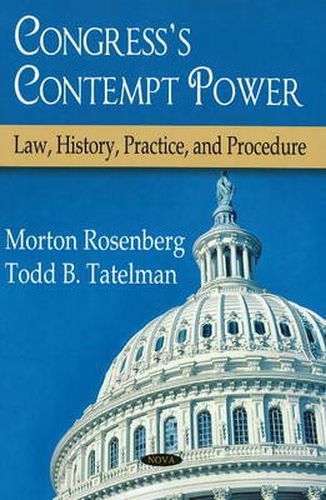Readings Newsletter
Become a Readings Member to make your shopping experience even easier.
Sign in or sign up for free!
You’re not far away from qualifying for FREE standard shipping within Australia
You’ve qualified for FREE standard shipping within Australia
The cart is loading…






Congress’s contempt power is the means by which Congress responds to certain acts that in its view obstruct the legislative process. Contempt may be used either to coerce compliance (inherent contempt), punish the contemnor (criminal contempt),and/or to remove the obstruction (civil contempt). Although arguably any action that directly obstructs the effort of Congress to exercise its constitutional powers may constitute a contempt, in the last seventy years the contempt power (primarily through the criminal contempt process) has generally been employed only in instances of refusals of witnesses to appear before committees, to respond to questions, or to produce documents. This book examines the source of the contempt power, reviews the historical development of the early case law, outlines the statutory and common law basis for Congress’s contempt power, and analyses the procedures associated with each of the three different types of contempt proceedings. In addition, the book discusses limitations on both constitutional and constitutionally based on the power.
$9.00 standard shipping within Australia
FREE standard shipping within Australia for orders over $100.00
Express & International shipping calculated at checkout
Congress’s contempt power is the means by which Congress responds to certain acts that in its view obstruct the legislative process. Contempt may be used either to coerce compliance (inherent contempt), punish the contemnor (criminal contempt),and/or to remove the obstruction (civil contempt). Although arguably any action that directly obstructs the effort of Congress to exercise its constitutional powers may constitute a contempt, in the last seventy years the contempt power (primarily through the criminal contempt process) has generally been employed only in instances of refusals of witnesses to appear before committees, to respond to questions, or to produce documents. This book examines the source of the contempt power, reviews the historical development of the early case law, outlines the statutory and common law basis for Congress’s contempt power, and analyses the procedures associated with each of the three different types of contempt proceedings. In addition, the book discusses limitations on both constitutional and constitutionally based on the power.